H I G H L I G T H
UESP leads R&TD activities of the “CEC-Made-Shoe” project
INESC Porto strengthens competitiveness of the European footwear industry 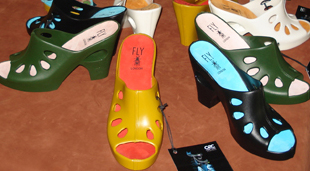
The “CEC-Made-Shoe” European Project has developed a set of radical innovations that promise to revolutionise the footwear industry. The results of the project have already been applied in some Portuguese companies, such as Kyaia, Procalçado and Aerosoles. This project’s aim is to increase the competitiveness of European SMEs in the footwear industry and also reach 10% of the world’s production until 2010. The Manufacturing Systems Engineering Unit (UESP) of INESC Porto was one of the project’s main partners, having developed new manufacturing processes and concepts that cause a direct impact on the companies’ productivity.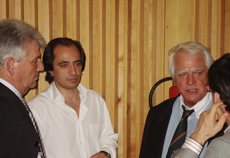 Strengthening the European footwear industry Strengthening the European footwear industry
Launched and managed by the European Confederation of the Footwear Industry, this project has involved more than 60 partners - eight of which Portuguese – from 14 different countries that joined efforts to strengthen the European position in the international footwear industry, through the development of radical technological innovations.
INESC Porto was the fourth entity with largest participation in the project that had a total budget of 20 million Euros. The Institute carried out R&TD activities related to logistics, quality and company networks.
Radical improvements in the manufacturing process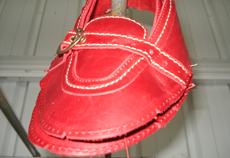
This partnership has developed over the last four years and registered results such as extremely comfortable environment friendly materials, management and manufacturing systems/processes that are more versatile and effective, as well as new business models, just to name a few.
The results with largest impact in the footwear industry include the design of new products: biodegradable shoes, intelligent shoes (shoes that adapt to the environment's conditions) and seamless shoes.
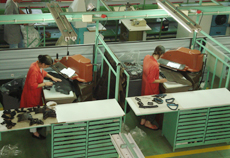 The success of team work The success of team work
From the results developed by INESC Porto, we would like to highlight the “One Step Production Process” (a new process of manufacturing shoes in just one stage), the “PICShoe” (an integration and coordination system for the supply chain), and the “Pervasive Quality Control” (a new manufacturing environment where the main goal is the high quality of the end product).
The team from the Manufacturing Systems Engineering Unit (UESP) of INESC Porto - set up by Rui Rebelo, Paula Silva, César Toscano, Pedro Ribeiro, Paulo Marques, Fernando Guedes and Daniel Machado – played an extremely important role in these three highly innovative processes.
One step towards innovation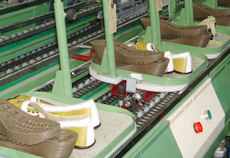
The “One Step Production Process” consists of a revolutionary manufacturing concept characterised by a one-stage shoe manufacturing (cutting, seaming, setup and finishing). For that, they use an innovative logistics system (ONE STEP) that is highly flexible and easily adaptable to new simulation models, as well as an innovative balancing/scheduling software for the production line. This led to an increase of more than 15% in productivity, and to the production of smaller manufacturing batches. At the same time, there was also an increase in the productive capacity, flexibility and a reduction of delivery deadlines.
The “PICShoe” consists of an integration and coordination system for the supply chain based on workflow management technology. The aim is to automate, standardise and facilitate “Business-to-Business” communication processes between shoe manufacturers, suppliers and subcontractors. This system unifies communication processes with business partners, reducing response times for budget requests and new orders. At the same time, the system reduces errors and decreases costs associated to order processing, thus improving workflow as well.
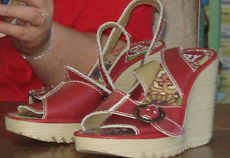 More quality and efficiency in the Footwear sector More quality and efficiency in the Footwear sector
The “Pervasive Quality Control” creates a new manufacturing environment where the main goal is the high quality of the end product. The system is set up by a hardware infrastructure based on sensors and on three software models that monitor and automatically control the critical parameters of the productive processes, as well as the planning and register of quality control inspections and the definition of the best manufacturing parameters to use in future productions. Kyaia now relies better on the quality of the end product even for the manufacturing of smaller product amounts. At the same time, the company has managed to decrease setup times and to reduce non-quality costs.
It is also important to highlight that INESC Porto (represented by Luís Carneiro) has assumed the coordination of the Workpackage that included all of the project’s R&TD activities related to information and communication systems. These activities involve 19 partners from seven different countries and its goal is to develop and implement an electronic infrastructure between consumers, retailers, manufacturers, component and material suppliers, throughout the whole footwear value chain. From the activities that were developed, we would like to highlight the definition of standards for the sector’s electronic business, as well as systems for strategic collaboration networks and a European retail platform.
The European footwear industry is an international reference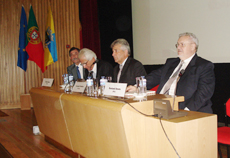
The Chief Executive Officer of the European Confederation of the Footwear Industry, one of the speakers in the public presentation of the “CEC-Made-Shoe” – the presentation took place last June at the facilities of Kyaia (Paredes de Coyra) -, considers that such projects strengthen Europe’s position in the footwear industry, thus guaranteeing that the industry “remains an international reference in the future”.
Roeland Smets believes that Portugal may play an extremely important role in the future of the European footwear sector, stating that “the Portuguese industry has invested in this industry like no other country and that will make all the difference when the current international economic confusion is overcome”.
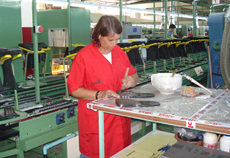 "CEC -Made-Shoe" triggers revolution "CEC -Made-Shoe" triggers revolution
Effectively, the Portuguese participation in this area in general, and INESC Porto’s in particular, is the result of a consistent and acknowledged investment in the sector, namely in several R&TD projects supported by national and European programmes.
The impact of the "CEC-Made-Shoe" project in the national industry is already clear. References of the national footwear industry, such as Aerosoles (one of Portugal’s most international shoe brands), Procalçado (Shoe Component Producer) and Kyaia (a company that registered a 26 million Euro profit in 2007) are some examples of companies that have welcomed some of the proposed solutions within the project.
|


 Strengthening the European footwear industry
Strengthening the European footwear industry
 The success of team work
The success of team work
 More quality and efficiency in the Footwear sector
More quality and efficiency in the Footwear sector
 "CEC -Made-Shoe" triggers revolution
"CEC -Made-Shoe" triggers revolution